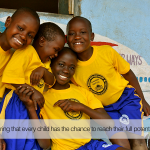Facebook Under Fire for Failing to Prevent Child-Bride Auction

Facebook is facing worldwide condemnation for failing to notice a child-bride auction on its platform for 15 days after the post went live.
The story so far
A Sudanese man is reported to have used the social media platform to auction off a 16-year old girl to the highest bidder, and the social media giant failed to notice until after the girl was married off.
The auction, which took place earlier this month, yielded the girl’s father 500 cows, three cars and $13,000 in exchange for his daughter, after she was bid on by five men, some of whom are reportedly high-ranking South Sudanese government officials.
The South Sudanese National Alliance for Women Lawyers (NAWL) says this is the highest price that has been reported for a bride in the region.
Human rights organisations have hit out at the social media giant for failing to adequately monitor its site and not doing enough to protect the rights of women and children.
Plan International, an organisation which fights the exploitation of children, has called the incident a “barbaric use of technology” reminiscent of “latter day slave markets.”
They fear that because the auction yielded such a high price, it could inspire other families to use social media sites to do the same thing.
Child brides
Despite the fact Western society views the practice of ‘bidding’ for brides as abhorrent, it is common practice in many poor and developing countries.
Accurate figures are not easy to come by, but some statistics suggest that India has the highest number of child brides in the world.
Indonesia, Brazil and Mexico each also have high numbers of child brides, as do many countries within Africa including Kenya, Ethiopia and Uganda.
Calls to investigate
There have been calls for the South Sudanese government to investigate and suspend any officials involved in the bridal auction, as child marriage is illegal in Sudan.
However, the government says it cannot regulate communities’ cultural norms, especially in remote areas, explaining that the practice is a long-standing and widely-accepted one.
High levels of poverty, conflict, instability, low literacy rates, and gender inequality in education fuel child marriage in South Sudan, with many families viewing early marriage as a way to protect girls from pre-marital sex and unwanted pregnancies.
Families hope it can help their daughters escape poverty, while also assisting the family as a whole through the funds and items received in exchange for the ‘trade’.
UNICEF statistics suggest that 52 percent of girls in South Sudan are married before they turn 18.
High cost of disempowering women
International organisation ‘Girls Not Brides’, estimates that every year around the world 12 million girls are married before the age of 18.
They say child brides face more risks of experiencing dangerous complications in pregnancy and childbirth, contracting HIV/AIDS and suffering domestic violence. It signals the end of their childhoods and their education.
Aside from the human cost the World Bank produced a report earlier this year detailing the economic cost of failing to educate girls and women. Economic modelling shows that globally the cost is $30 trillion in lost earnings and productivity.
While Girls not Brides is fighting in many ways to end the practice of child marriage, one of its cornerstone campaigns is to have a 18 years as a minimum age of marriage adopted as law in every country.
In 93 countries around the world, marriage can occur between young people under the age of 18 with parental consent.
In Australia, you must be 18 years of age to get married legally. If you are between the ages of 16-18 you can only get married with a court order which can be granted in “exceptional and unusual” circumstances.







